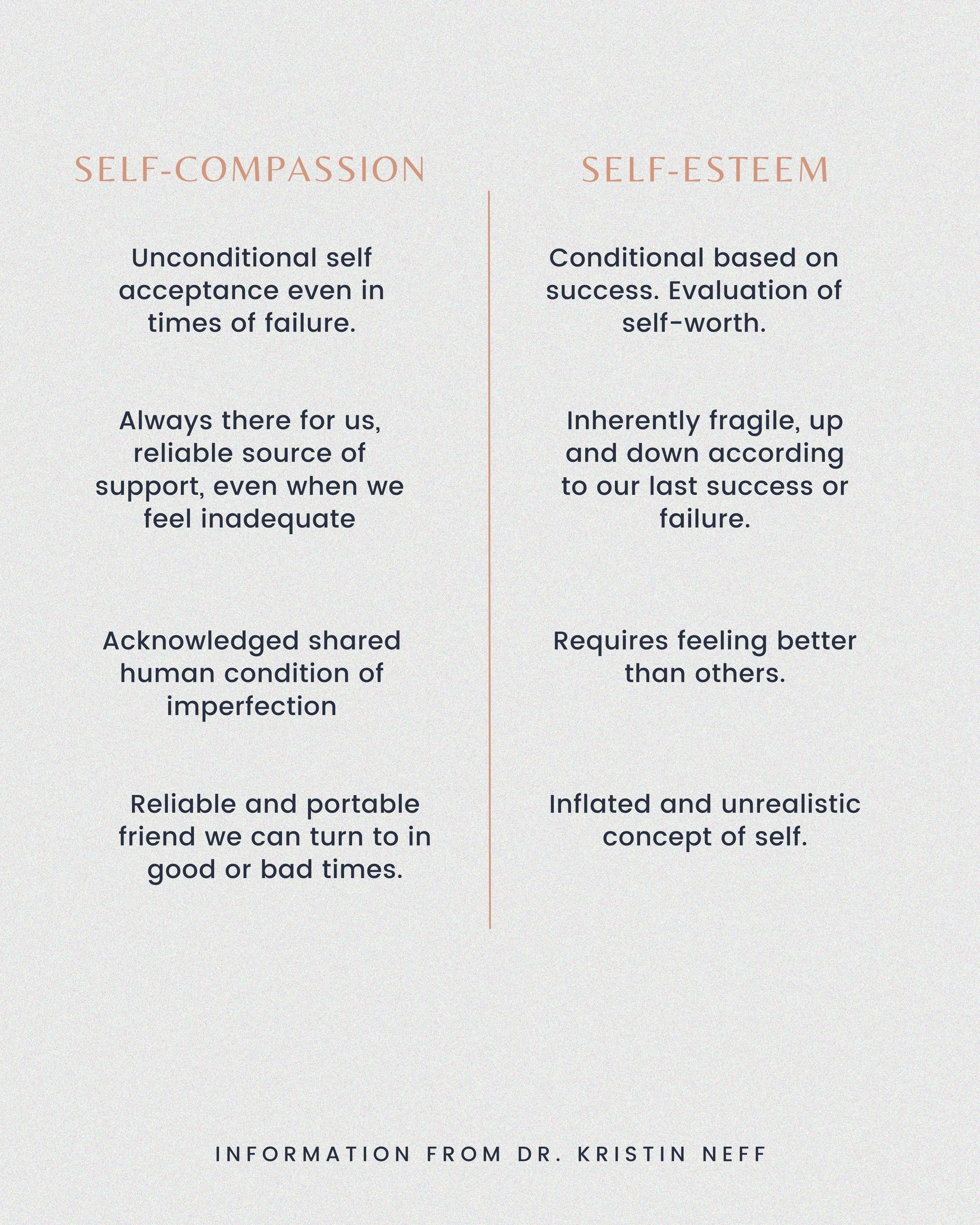Self-Esteem vs. Self-Compassion
Is Self-Compassion healthier than Self-Esteem?
As humans, we often strive to be our best selves and attain high levels of self-esteem. While self-esteem can be a valuable trait, it is not the same as self-compassion. In fact, self-compassion is becoming increasingly recognized as an essential component of well-being.
So, what is the difference between the two?
Self-esteem involves evaluating ourselves and our abilities positively, while self-compassion entails being understanding and kind towards ourselves, especially in times of failure or difficulty. Recognizing and cultivating self-compassion is an important step to not only improve our mental health but also to lead a fulfilling life.
So, let's take a look at these concepts and understand the difference between them, and why Self-Compassion the healthier tool for us.
Before I began a deep dive into Self-Compassion, I’m not sure if I could recognize the difference between these two ways of being. Here’s a very brief comparison to get us started.
Self-esteem was a virtual phenomenom for many years, the world was obsessed wtih elevating our Self-Esteem believing that our Self-Worth was within this idea of “having high self-esteem”. In fact the pursuit of Self-Esteem is only the beginning…
“Once you’ve gotten high self-esteem, how do you keep it? It’s an emotional roller-coaster ride: our sense of self-worth bounces around like a ping-pong ball, rising and falling in lock-step with our latest success or failure.” -Kristin Neff
Self-Esteem says:
You’re so great because of the conditions of your success! (so you better keep it up!)
Self Compassion says:
No matter what happens, I’ll be there for you.
Self Compassion does not avoid painful emotions or by-pass moments of suffering. It recognizes suffering and tends to it with kindness and the acknowledgement of humanity’s commonality. It’s says, “it’s human to feel suffering, and I’m so sorry you’re feeling these difficult emotions. How can I support you?”
Self Compassion wraps our pain in a warm embrace, allowing us to move through it and generating positive feelings of love and connectedness. It’s like a inner loving parental care for ourselves.
While Self-Esteem elevates and crashes with our worldly stock, Self-Compassion is consistent. Focusing on Self-Compassion over Self-Esteem can dramatically change our relationship with ourselves and life.
Higher Self Compassion is associated with Higher levels of
Happiness
Optimism
Life Satisfaction
Body Appreciation
Motivation and Perceived Competence
And Lower levels of
Depression
Anxiety
Stress
Rumination
Self-Criticism
Perfectionsim
Body Shame
Fear of Failure
Even when the research (Neff&Vonk, 2009) shows that Self-Compassion is the healthier choice, it can still be hard to trust that it won’t turn us into a weaker and less productive human. People might think it’s too “wishy washy”.
Self-Compassion is not weak, it can be a FIERCE form of Self-protection and self support. A source of strength in challenging times. It’s not the same as self-pity, Self-Compassion takes actions to move through the pain, while self-pity would rather dwell in it, (which can be needed from time to time).
In conclusion, while self-esteem has long been regarded as an essential aspect of mental health, research has shown that self-compassion may be a healthier alternative. Self-compassion allows us to acknowledge and accept our mistakes and imperfections without judgment, which reduces the stress and anxiety associated with being overly critical of ourselves.
When we practice self-compassion, we are more likely to take care of ourselves, make healthier decisions, and cultivate positive relationships with others. In contrast, an excessive focus on self-esteem can lead to a constant need for validation and comparison, ultimately compromising our overall well-being.
For more information check out this article


